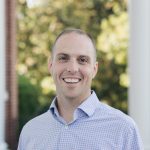The Purpose
The goal of the Faith, Work and Economics (FWE) Curriculum Project at Southeastern is for subject-matter experts to address the intersection of FWE from their various subject areas. Historically, FWE has played far too small a role in the theological education of Pastors and Missionaries.
Understandably, courses on macro or micro economics are a tough sale when vying for space in the crowded curricular real estate of the Master of Divinity or a similar Master of Arts degree. Nevertheless, the role of the Christian faith and its impact on Christian work and our broader economic participation exposes, in a way that little else does, just how integrated our Christianity is into our everyday, ordinary lives.
Christians who struggle to see value in their work fail to recognize that they are Saints who are being equipped for the “work of the ministry” (Ephesians 4:12).
And he gave the apostles, the prophets, the evangelists, the shepherds and teachers, to equip the saints for the work of ministry, for building up the body of Christ. (Ephesians 4:11-12)
This ministry of reconciliation (2 Corinthians 5:17) to which all Christians are called is not the “equipping” kind as Paul expects of pastors/elders in Ephesians 4:11. For the 4:11 folk, their target audience is local congregations. For Ephesians 4:12 folk—the vast majority of Christians—their target audience is everyone else, wherever God has placed them via their work, neighborhoods, soccer leagues, grocery stores and PTA clubs.
This Ephesians 4:12 ministry begins with love for God and neighbor, especially toward those with and around whom we work and play. I often remind my congregation, “The people you work alongside don’t come to my office for advice and counseling. They have you instead. God has placed you in their lives to minister Christ to them. Fulfill your ministry by giving Christ to the world while turning wrenches, teaching fifth graders and delivering industrial supplies.”
Further, our work participates in larger, cooperative economic systems locally, nationally and globally. Many are quick to dismiss economics conversations as the boring business of CSPAN. For Christians, this dismissal is a mistake. While one’s interest in economics may vary, participation in economics is not an option. And, such systems directly affect citizens of every civilization. This is precisely why it must matter to Christians, those who above all ought to be concerned with how people are treated and affected through the exchange of goods and services.
Whether concerning work or economics, the greatest Christian concern should align with the Great Commandment of love for God and neighbor. These twin commandments given first by Moses then reinforced by Jesus serve as the grand bulls-eye for life. As such, our approach to our work and our advocacy for economic systems and policy should be informed and motivated by what promotes God-love and neighbor-love.
What to Expect
The contributors to the FWE Curriculum Project aim to mine the intersection of FWE and their respective subject-area in order to show the importance of these issues in their field, and to articulate how consideration of FWE from each subject area promotes greater love for God and others. The subject areas for this project include Old Testament, New Testament, Theology, Ethics, Missiology, Humanities and Historical Theology.
For continuity sake, each contributor will answer the following questions:
- What is the relationship between your discipline and FWE?
- How do you incorporate FWE into your classroom curricula?
- How does this relate to the Great Commission?
Each subject area demands more than a few blogs can represent (e.g. the entire Old Testament and 2000 years of Church History—oh my!). As such, each contributor only has space to consider one or two contact points of reflection in their subject-area.
Nevertheless, as curricular curators whose job is to equip the equippers (or, to serve the servants), we hope that these blogs will resource other professors, pastors, ministry leaders and students to think better (and more often!) about the intersection of Faith, Work and Economics. Ultimately, we hope to better equip and more faithfully serve God’s people, the Bride of the risen Christ.
Editor’s Note: This article is an installment in the FWE Curriculum Project. It originally published on March 23, 2017.





Comments and Pingbacks
2018-06-08 06:30:23
Transformation From the Inside Out: The Power of Prison Education | Intersect
[…] they are being prepared for meaningless? Absolutely not. As Dr. Benjamin Quinn mentioned in his opening article, these men are being educated, equipped and trained to offer spiritual advice and practical life […]